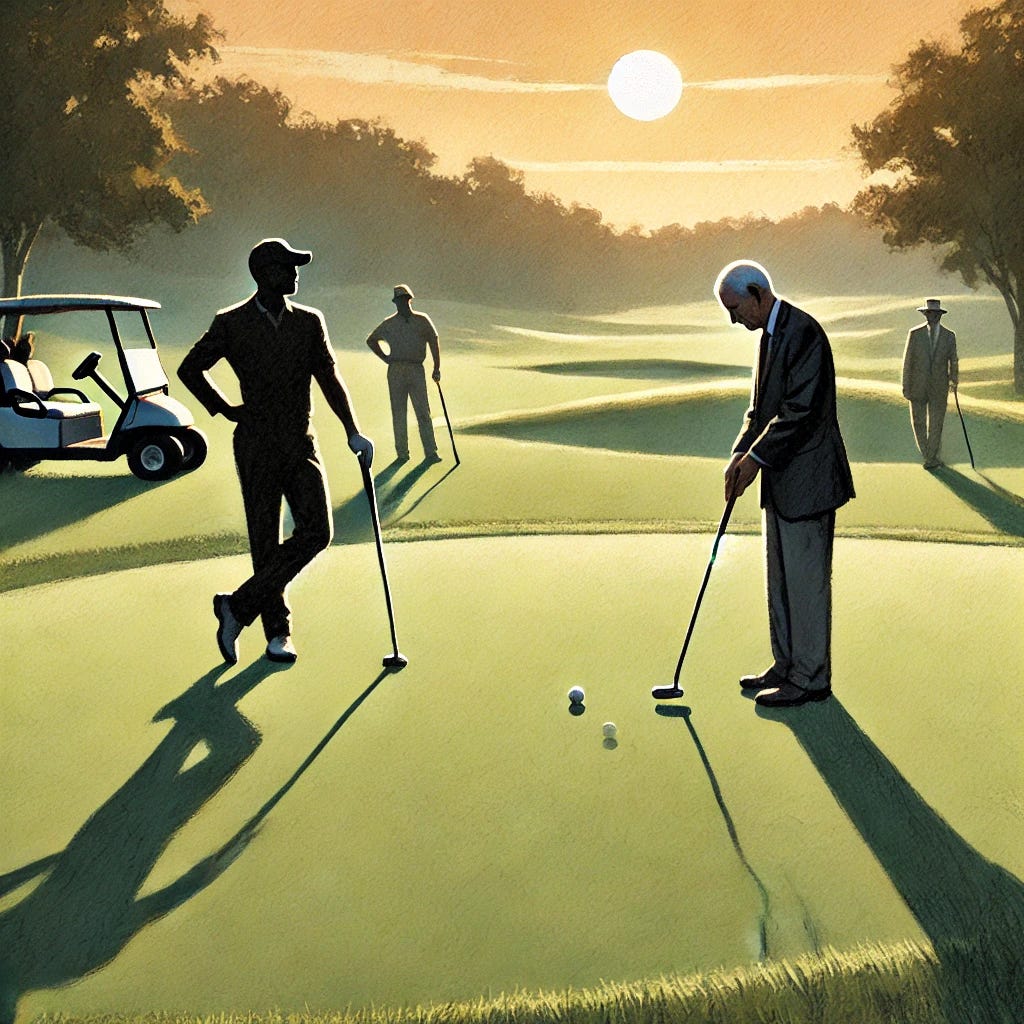Curveball
Politics, 800 words, 4 minute read. With Claude Sonnet.
"TRUMP TRUMPS EXPECTATIONS" screamed the Washington Post's headline, while Fox News went with "TRUMP'S SUPREME BETRAYAL?" The New York Times, usually so measured, simply printed "WHAT?" in unprecedented 72-point font.
In the marble-floored great room of Mar-a-Lago, Donald Trump stood before a wall of muted televisions, each one showing a different news anchor's slack-jawed expression. He wore a slight smirk, the same one he'd displayed decades ago on "The Apprentice" when a particularly elaborate scheme had come together.
It was October 2029, and Justice Sonia Sotomayor's retirement announcement had barely finished echoing through the halls of the Supreme Court before Trump seized his moment. The former president had been prowling the political sidelines for months, fuming at the indignity of already being called a lame duck while watching younger politicians claim his spotlight. Now that all changed.
"Look at them," Trump muttered, gesturing at the screens with his ever-present phone. "Total chaos. Complete meltdown. Beautiful, just beautiful." He thumbed through his Twitter feed – still refusing to call it 'X' – pausing occasionally to savor particularly outraged responses.
Ivanka stood in the doorway, her hand gripping the frame so tightly her knuckles had gone white. "Dad," she said, her voice carrying the weary tone of someone who'd spent decades managing her father's impulses. "You really did it."
"Nobody saw it coming. Nobody!" Trump's voice rose with familiar excitement. "Sleepy Joe's people, they're going crazy. The MAGA crowd – totally crazy. Everybody's crazy!"
"That's what concerns me," Ivanka replied, stepping into the room. The click of her heels echoed off the marble. "Dad, you've spent years building a movement. This could destroy everything you've—"
"Wrong!" Trump spun to face her, but his expression softened slightly. "Watch. Just watch. Sometimes you have to burn everything down to build something bigger. Much bigger. The biggest."
Across Washington, in the Obamas' Kalorama residence, Barack stood in his vegetable garden, phone pressed to his ear, soil still fresh under his fingernails. Michelle appeared on the back porch, took one look at his expression, and knew something seismic had occurred.
"Donald," Obama said, his voice carrying that careful measure he'd perfected over decades of crisis management. "I appreciate the... unexpected offer. But I have to ask – why?"
Through the phone came Trump's distinctive chuckle. "Because they all think they know me. They all think they've got Trump figured out. But nobody knows Trump like Trump."
In the Senate, the tremors spread quickly. Senator Lisa Murkowski paced her office, phone trapped between ear and shoulder as she scribbled notes. "No, listen," she said to an unseen colleague. "This isn't about Trump or Obama anymore. This is our chance. The middle ground we've been talking about? It just appeared."
The confirmation hearings unfolded like a political fever dream. Obama sat before the Judiciary Committee, silver-haired but sharp as ever, while senators from both parties struggled to adapt their prepared questions to this unprecedented situation.
"Mr. President – excuse me, Professor Obama," Senator Cruz began, tugging at his collar. "Your previous statements about executive power..."
"Please, Ted," Obama interrupted with that familiar half-smile. "After all these years, I think you can call me Barack. And yes, let's talk about executive power. I suspect my views might surprise you."
As the hearings progressed, something shifted in Washington's political tectonics. It wasn't just the vote count slowly ticking up – it was the conversations in corridor corners, the late-night phone calls between old rivals, the gradual realization that this bizarre moment might offer an escape from decades of political trench warfare.
The night before the final Senate confirmation vote, Trump's phone lit up with a text from Obama: "Golf tomorrow?"
Trump stared at the message for a long moment. In the reflection of his phone screen, he could see himself: older now, grayer, the weight of history pressing down. His thumbs hovered over the keyboard before typing: "Only if you're ready to lose. Again."
The next morning, as Washington prepared for the confirmation vote, two former presidents stood on a golf course in Virginia. Their caddies maintained a respectful distance, straining to hear the conversation.
"You still haven't told me why," Obama said, lining up a put. "The real reason."
Trump watched the ball roll toward the hole. "Maybe I'm tired of the game. Maybe it's time for a new one."
The ball dropped in with a soft thunk. Obama straightened up, shielding his eyes against the morning sun. "And what game would that be?"
"Winning," Trump replied, but his voice had lost its usual bombast. "But winning different. Winning bigger. Winning where everybody thinks you lost."
Back in Washington, the Common Ground Coalition was gathering strength. Moderates from both parties joined in. Republicans and Democrats found themselves in the strange position of defending the choices of a madman.



